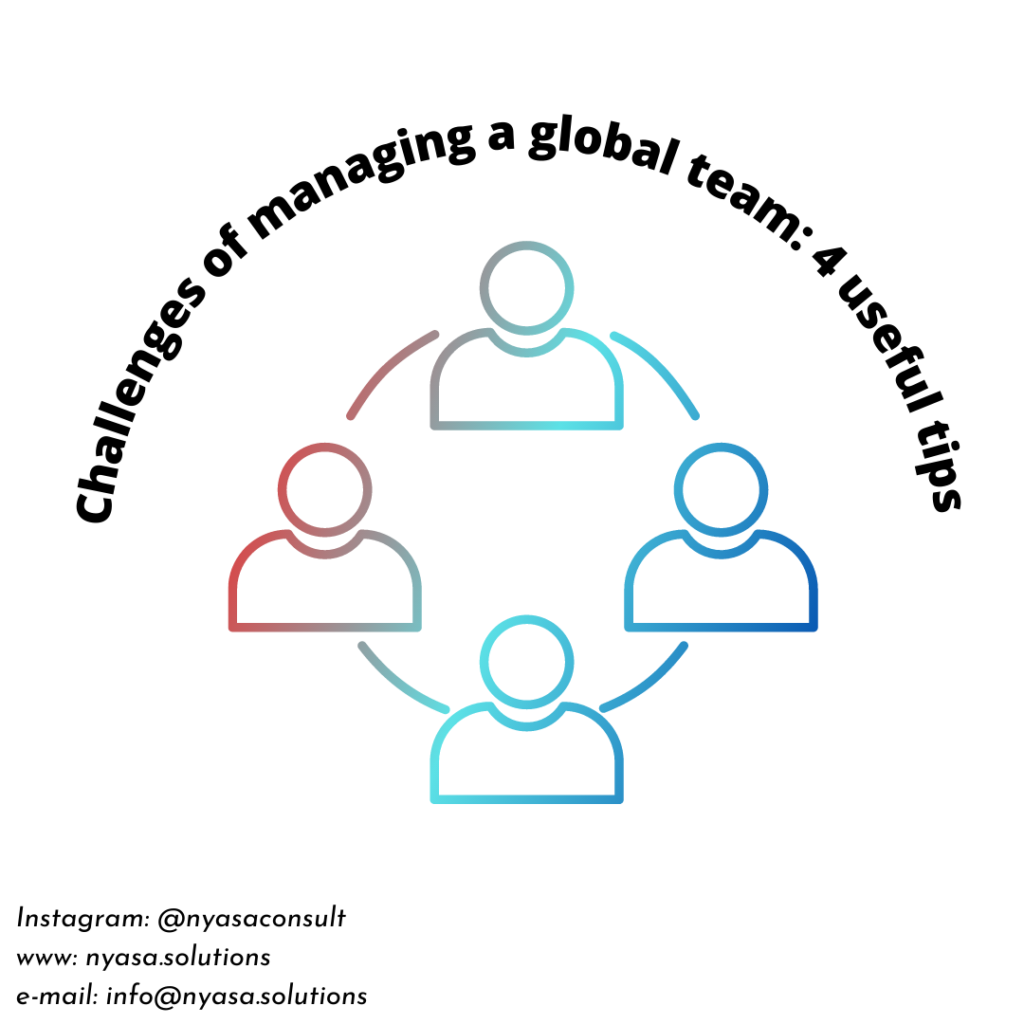What are the challenges of managing a global team? What tips can you follow to start with?
Does your teamwork across the world and in different time zones? For example, the technicians are in India, the project leaders in Germany, France, and the United States, and you as a manager in the Netherlands. You work together daily, but perhaps you have (partly) never met each other.
Differences in backgrounds and languages within a team can lead to (serious) misunderstandings. Creating solidarity within an international team is one of the challenges of global management. How do you then make the collaboration successful?
The advantages
- Working with international colleagues stimulates flexibility and increases availability. When you can divide the work among people in different time zones, your team will finish the project within e.g. 24 hours instead a few days.
- Working virtually is a good way to cut costs e.g. especially travel costs.
- Working with different cultures doesn’t only help bridge the cultural differences, it is also motivating and enriching. This offers an opportunity to share best practices, discover new work methods, and broaden your own insights.
The challenges
Managing a global team comes with its challenges. Communication is more difficult due to language differences and the lack of personal contact and non-verbal communication. This makes the risk of misunderstandings greater and less noticeable than in traditional teams. That can lead to conflict.
The distance can make it difficult to create a genuine team spirit, mutual understanding, friendships, and connection. One may feel disconnected or frustrated. It is therefore very important that team members are independent and can motivate themselves.
4 Tips and keys to success
One should always keep in mind that a remote team is more difficult to manage than a traditional team. Motivating people for a common goal and building trust is therefore crucial.
1. Adjust the management style
In some cultures, people expect their manager to have direct control over their team. This is not possible with international management. In the Netherlands and Scandinavia, for example, managers act as facilitators. This way of working is also not suitable for virtual teams and can lead to misunderstandings and errors of interpretation.
In an ideal situation, you should be seeking the right balance between the two leadership styles, in which a manager takes the lead and instills trust, but also trusts others in delegating to colleagues.
2. Pay attention to communication style
You need an explicit communication style to effectively lead international teams. As a manager, you should explain everything clearly and in detail. The team should know what the common goals are. What tasks need to be performed and by whom and who needs to be informed, by whom, how often, and how. Therefore, to avoid confusion, the manager must give extremely clear instructions.
3. Manage cultural differences
When it comes to a multicultural virtual team, there are a couple of challenges one will have to deal with e.g. views on time, hierarchy, conflict management, communication, etc. When a German project leader sets a deadline for his or her Indian team members on software delivery, the leader should be aware of all cultural factors that could jeopardize meeting this deadline.
Something that works well in one culture may not work in another. These differences can lead to misunderstandings and irritations. That is why it is important to learn about the culture of the team members and reach an agreement with their consent. The goal is to do the work together and create a kind of common culture, based on synergy and complementation, among the team members.
When we are aware of the cultural differences, it is easier to set new rules based on:
- the decision-making process.
- communication style and method.
- managing deadline.
- method of feedback.
It is also important to clearly define the negative implications of not following these rules. It must be clear what role someone has because with intercultural teams there is no room for uncertainty.
4. Organizing virtual meetings
Regular video conferences are essential for team building, even when everything seems to be running smoothly. The manager should focus on things that are going well and strive for a positive team spirit. Never forget to celebrate group successes either!
These meetings should provide opportunities to share experiences and discuss issues. They can also simply serve to chat with each other, just like traditional team members would have their “coffee machine chat”. This creates a team spirit and ensures a stable working relationship. If team members know each other better, despite not being able to meet in person, it will result in more confidence, a real team spirit, and more success.
Customized training
Customization is our specialty. Your wishes with regard to learning objectives, content, training form, duration, and location are central. We offer the training individually as well as in a group. Depending on the learning objectives, we determine the duration and scope. The training can take place at your place of work (in-company), at one of our training locations, or online in the virtual classroom. More information? Please feel free to contact us here or by emailing at info@nyasa.solutions


Pingback: Resolving conflicts in hierarchical work cultures - Nyāsa